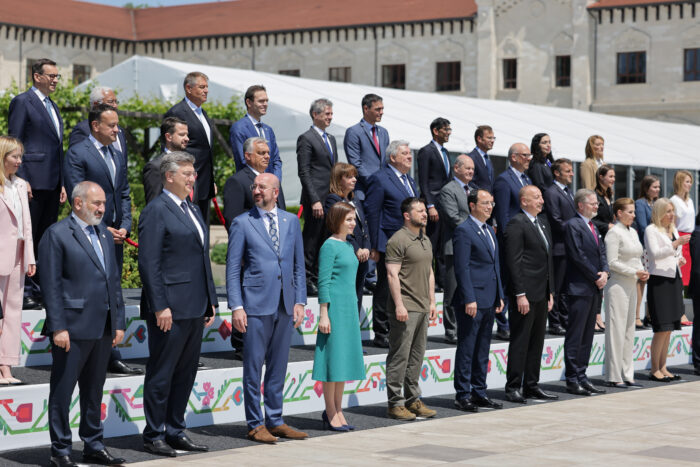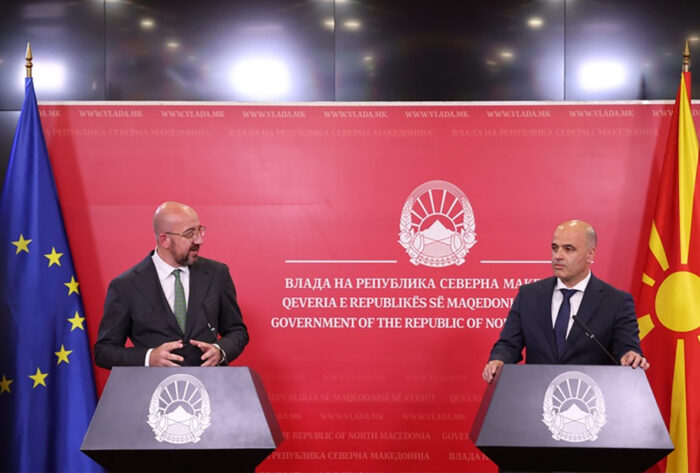Find all related Progressive Post
Progressive Post
20 years ago, the leaders of the EU and the Western Balkans committed themselves to the Thessaloniki Declaration. In the first few lines, they agreed on the unequivocal support towards the European perspective of the Western Balkan countries. The future of the Balkans was to be within the European Union.
The Thessaloniki Declaration was an initial roadmap for the EU accession of the countries of the Western Balkans. It outlined a few basic priorities, principles and mutual commitments:
These goals were a short but clear description of the challenges and problems the Balkans faced. And the European Union, as well as the prospect of joining it, was to become the catalyst for change and solutions to these issues in the region.
On the positive side, the EU’s engagement, backed by the Thessaloniki Declaration, has contributed to strengthening democratic institutions, promoting the rule of law and advancing human rights in the Western Balkans. Progress has been made in areas such as judicial reforms, media freedom and the fight against corruption. The declaration provided a roadmap for the Western Balkan countries’ European integration aspirations. As a result, Croatia joined the EU in 2013, and Montenegro and Serbia are currently negotiating for EU membership. Albania and North Macedonia have also made significant progress towards opening accession talks. At the same time, the declaration fostered regional cooperation and reconciliation, paving the way for improved relations between countries in the Western Balkans. Platforms such as the Regional Cooperation Council (RCC) have been instrumental in enhancing dialogue, resolving disputes and promoting economic integration.
On the negative side, major progress and breakthroughs have been rare, stifled or left unrewarded by the EU. As years went by a spiral of inertia overtook the accession process. From democratic practices to the resolution of conflicts, to economic progress and transparency, much still is lacking. And economic stagnation has led to the migratory bleeding of the youngest and most talented of the region. This cycle of inertia has been gradually transformed into a worrisome pattern of finger-pointing. EU member states often lay the responsibility on the candidate countries for not quickly reforming and not being able to solve long-standing conflicts, while those in the Western Balkans point to the lack of true appetite from member states towards further enlargement which has undermined the candidates’ political will and genuine efforts for change.
Arguments from both sides abound. After the Prespa Agreement – which yes, was catalysed by the prospects of EU accession – North Macedonia was not rewarded as it faced a veto from France and then a new stumbling block from its neighbouring Bulgaria. On the other hand, the systematic efforts of the EU to end the difficult Kosovo-Serbia dispute continue to be bogged down in the mutual mistrust that characterises both sides.
We must break this cycle of blame game. Because the real challenge is an existential one for Europe itself. It is not whether the Balkans will be Europeanised but whether Europe will be balkanised.
The frequent crises Europe has been facing have been accompanied by deep inequalities, a sense of disempowerment and insecurity in our societies, which have become the breeding ground for authoritarian leaders, demagoguery, conspiracy theories and Neo-nazi, ultra-right tendencies. The motto of those groups – ‘take back control’ – is a neo-nationalistic vision of societies, where fear and hatred reign. As democrats, as Socialists and Progressives, we must reframe this destructive narrative.
The war on our borders has shattered our complacency and the belief that history is on our side. Yes, we must take control! But our empowerment, our sense and ability to control our future, will never be realised through a nationalistic vision. It can only be possible if the European Union steps up to unify around the values of social inclusion, peaceful resolution of conflict and deepening participative democracy, with transparency and green sustainable development. And if it shows the will to become strong enough to defend these values in practice.
No, the Balkans are not a separate, distant issue. The fight for these values written down in the Thessaloniki Declaration is a fight for Europe itself. Reinvigorating the accession process and giving new hope and prospects to our transformation is at the heart of what Europe faces today – the defence of basic democratic and humane values as we face the challenges of the future.
And our progressive family is called upon, once more, to make the historic difference.
Photocredits: European Communities, 2003
| Cookie | Duration | Description |
|---|---|---|
| cookielawinfo-checkbox-advertisement | 1 year | Set by the GDPR Cookie Consent plugin, this cookie is used to record the user consent for the cookies in the "Advertisement" category . |
| cookielawinfo-checkbox-analytics | 11 months | This cookie is set by GDPR Cookie Consent plugin. The cookie is used to store the user consent for the cookies in the category "Analytics". |
| cookielawinfo-checkbox-functional | 11 months | The cookie is set by GDPR cookie consent to record the user consent for the cookies in the category "Functional". |
| cookielawinfo-checkbox-necessary | 11 months | This cookie is set by GDPR Cookie Consent plugin. The cookies is used to store the user consent for the cookies in the category "Necessary". |
| cookielawinfo-checkbox-others | 11 months | This cookie is set by GDPR Cookie Consent plugin. The cookie is used to store the user consent for the cookies in the category "Other. |
| cookielawinfo-checkbox-performance | 11 months | This cookie is set by GDPR Cookie Consent plugin. The cookie is used to store the user consent for the cookies in the category "Performance". |
| csrftoken | past | This cookie is associated with Django web development platform for python. Used to help protect the website against Cross-Site Request Forgery attacks |
| JSESSIONID | session | The JSESSIONID cookie is used by New Relic to store a session identifier so that New Relic can monitor session counts for an application. |
| viewed_cookie_policy | 11 months | The cookie is set by the GDPR Cookie Consent plugin and is used to store whether or not user has consented to the use of cookies. It does not store any personal data. |
| Cookie | Duration | Description |
|---|---|---|
| __cf_bm | 30 minutes | This cookie, set by Cloudflare, is used to support Cloudflare Bot Management. |
| S | 1 hour | Used by Yahoo to provide ads, content or analytics. |
| sp_landing | 1 day | The sp_landing is set by Spotify to implement audio content from Spotify on the website and also registers information on user interaction related to the audio content. |
| sp_t | 1 year | The sp_t cookie is set by Spotify to implement audio content from Spotify on the website and also registers information on user interaction related to the audio content. |
| Cookie | Duration | Description |
|---|---|---|
| CONSENT | 2 years | YouTube sets this cookie via embedded youtube-videos and registers anonymous statistical data. |
| iutk | session | This cookie is used by Issuu analytic system to gather information regarding visitor activity on Issuu products. |
| s_vi | 2 years | An Adobe Analytics cookie that uses a unique visitor ID time/date stamp to identify a unique vistor to the website. |
| Cookie | Duration | Description |
|---|---|---|
| NID | 6 months | NID cookie, set by Google, is used for advertising purposes; to limit the number of times the user sees an ad, to mute unwanted ads, and to measure the effectiveness of ads. |
| VISITOR_INFO1_LIVE | 5 months 27 days | A cookie set by YouTube to measure bandwidth that determines whether the user gets the new or old player interface. |
| YSC | session | YSC cookie is set by Youtube and is used to track the views of embedded videos on Youtube pages. |
| yt-remote-connected-devices | never | YouTube sets this cookie to store the video preferences of the user using embedded YouTube video. |
| yt-remote-device-id | never | YouTube sets this cookie to store the video preferences of the user using embedded YouTube video. |
| yt.innertube::nextId | never | This cookie, set by YouTube, registers a unique ID to store data on what videos from YouTube the user has seen. |
| yt.innertube::requests | never | This cookie, set by YouTube, registers a unique ID to store data on what videos from YouTube the user has seen. |
| Cookie | Duration | Description |
|---|---|---|
| COMPASS | 1 hour | No description |
| ed3e2e5e5460c5b72cba896c22a5ff98 | session | No description available. |
| loglevel | never | No description available. |


